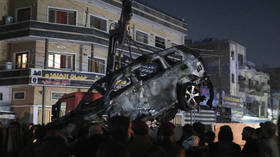US admits not informing Iraq about airstrikes

The US government has acknowledged that it did not notify officials in Baghdad about airstrikes on Iraqi soil last Friday, despite initially claiming they had been warned ahead of time. A top US spokesperson insisted there was no “intent to deceive,” chalking up the mishap to a simple error.
Speaking to reporters on Tuesday, White House National Security Council spokesman John Kirby corrected a prior statement about the “pre-notification to Iraqi officials” before last week’s air raid, which targeted more than 85 sites across both Iraq and neighboring Syria.
“I deeply apologize for the error, and I regret any confusion that it caused. It was based on information we had or that was provided to me in those early hours after the strikes. Turns out that information was incorrect,” Kirby said, adding “I hope that you’ll understand there was no ill-intent behind it, no deliberate intent to deceive or to be wrong.”
Though he previously said the bombings were clearly communicated to Baghdad ahead of time, Kirby was forced to walk back that claim following clarification by State Department deputy spokesperson Vedant Patel, who confirmed that Iraqi leaders were not informed until “immediately after the strikes occurred.”
According to US Central Command (CENTCOM), which oversees operations in the Middle East and Central Asia, the strikes involved “numerous aircraft,” which dropped over 125 precision munitions on dozens of targets. Among the sites hit were command and control installations, intelligence centers, weapons caches, and supply-chain facilities operated by Iranian-backed militias, CENTCOM added.
The operation was launched in retaliation for a string of attacks on US bases across the region, namely a January 28 drone strike that killed three American soldiers and wounded more than 40 others at a base in Jordan, near the Syrian and Iraqi borders.
Baghdad has repeatedly condemned recent US strikes on Iraqi territory, saying last week’s operations had pushed the region to the “brink of the abyss.” Government spokesman Bassem al-Awadi also denied that his country coordinated the action with Washington, accusing US officials of making a “false claim aimed at misleading international public opinion and disavowing legal responsibility.”
Iraqi Prime Minister Mohammed Shia al-Sudani has also personally criticized the American air raids, saying they compromise his country’s sovereignty and threaten regional stability. Following an earlier round of strikes in late January, the leader said the US was “undermining agreements and various sectors of joint security cooperation,” also stressing the need to “reshape the future relationship” with Washington.













